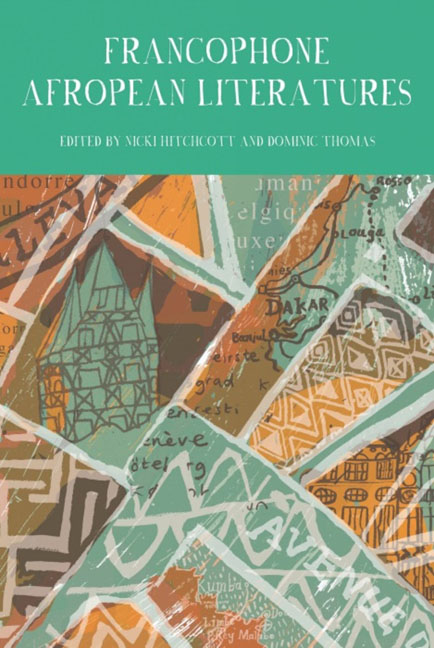Book contents
- Frontmatter
- Contents
- Introduction: Francophone Afropeans
- Essays
- Afropeanism and Francophone Sub-saharan African Writing
- The Transatlantic Poetics of Fatou Diome
- Corps Sans Titre: ‘Fleshiness’ and Afropean Identity in Bessora's 53 Cm
- Already Here: Sami Tchak's Afropean Generation
- Paris Polar: Afropean Noir in the City of Light
- Mapping Afropea: The Translation of Black Paris in the Fiction of Alain Mabanckou
- Relighting Stars and Bazaars of Voices: Exchange and Dialogue in Leonora Mianos Tels Des astres eteints and Alain Mabanckous Black Bazar
- Sex and the Afropean City: Léonora Miano's Blues Pour Élise
- Towards an Afropean Cosmopolitanism: Hospitality, Friendship and the African Immigrant
- Afropean Masculinities as bricolage
- Short Stories
- Notes on Contributors
- Index
Sex and the Afropean City: Léonora Miano's Blues Pour Élise
from Essays
- Frontmatter
- Contents
- Introduction: Francophone Afropeans
- Essays
- Afropeanism and Francophone Sub-saharan African Writing
- The Transatlantic Poetics of Fatou Diome
- Corps Sans Titre: ‘Fleshiness’ and Afropean Identity in Bessora's 53 Cm
- Already Here: Sami Tchak's Afropean Generation
- Paris Polar: Afropean Noir in the City of Light
- Mapping Afropea: The Translation of Black Paris in the Fiction of Alain Mabanckou
- Relighting Stars and Bazaars of Voices: Exchange and Dialogue in Leonora Mianos Tels Des astres eteints and Alain Mabanckous Black Bazar
- Sex and the Afropean City: Léonora Miano's Blues Pour Élise
- Towards an Afropean Cosmopolitanism: Hospitality, Friendship and the African Immigrant
- Afropean Masculinities as bricolage
- Short Stories
- Notes on Contributors
- Index
Summary
In his exploration of Henri Lefebvre's concept of the right to the city, geographer Mark Purcell reminds us that
Under the right to the city, membership in the community of enfranchised people is not an accident of nationality or ethnicity or birth; rather it is earned by living out the routines of everyday life in the space of the city. (2003: 102)
Of course, enfranchisement means benefiting from civil privileges that are not accessible to a large proportion of the black female population in Paris. Despite living out the routines of their everyday lives in the spaces of the French capital, many women of African origin are prevented from enjoying the right to the city because of their low and sometimes precarious economic and legal status. The same cannot be said of the protagonists of Léonora Miano's 2010 novel, Blues pour Élise [Blues for Elise]. Set in 2008, the text describes the everyday lives of a group of black women friends living in Paris. Like the four women in the well–known American sitcom alluded to in my title, Miano's four main protagonists are intelligent, financially independent and beautiful. As in Sex and the City, it is the relationships between the different characters that generate the narrative: intimate stories about sex and sexuality, family feuds and family secrets along with descriptions of other common features of everyday life such as trips to the hairdressers and house–warming parties, all combine to create a kind of black French literary sitcom. And yet, through the various emotional intrigues it describes, Blues pour Élise paints a radically new picture of black women in twentyfirst– century Paris. In this text, Miano's women are not disenfranchised, marginalized ‘immigrants’ but rather enfranchised urbanites who participate in and appropriate the city spaces they inhabit. This chapter will discuss the ways in which Miano celebrates and advocates the right to the city for contemporary black women in Paris and, in so doing, promotes her vision of an Afropean community.
In Chapter 2 of Blues pour Élise, we travel to an area of Paris with a relatively high Afro–Caribbean population: the 10th arrondissement, more specifically the boulevard de Strasbourg.
- Type
- Chapter
- Information
- Francophone Afropean Literatures , pp. 124 - 137Publisher: Liverpool University PressPrint publication year: 2014



